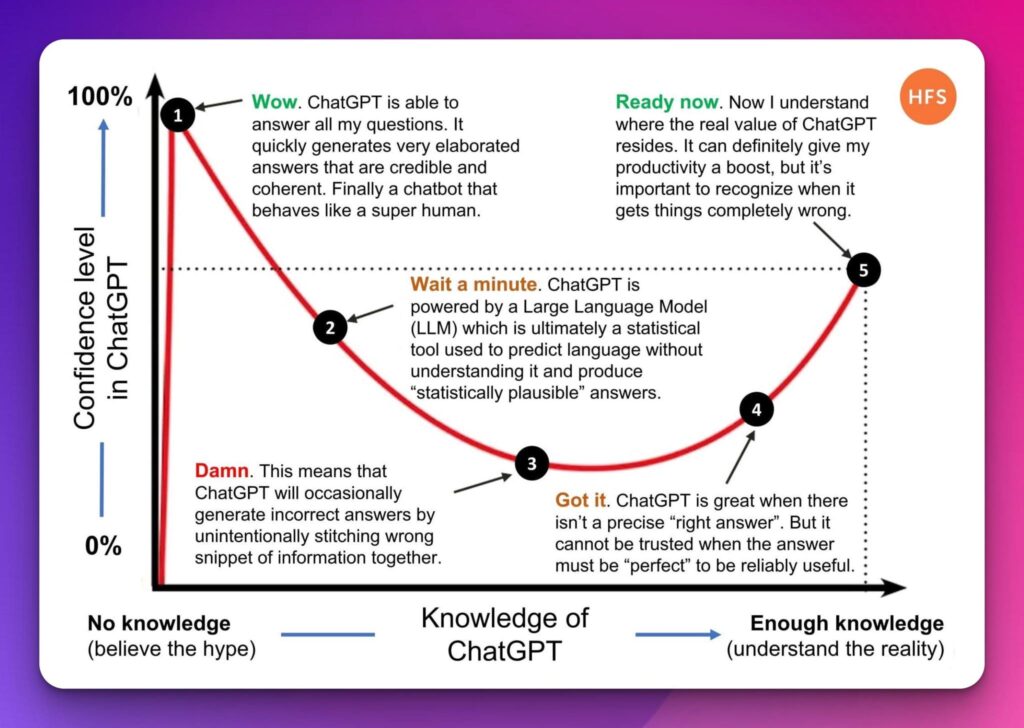What do we call the disappointment that first-time users feel when AI tools fail their expectations?
I know I got burned last year and I had my own WTF moment. I certainly don’t blame folks for feeling misled. For SO many reasons. The most harmful may be the hype that likely draws many first-time users–that AI will be a “Google-killer.” Well, since “Google” is synonymous with search the way Xerox was with copiers and Kleenex is with tissues, I don’t blame folks for expecting that the Google-killer would be good at search and research. But as we all soon discover, that’s not what this tool is–at least not in spring 2023.
The AI genealogy learning curve is harsh, and for most of us, involves an early fall off the cliff of the Dunning–Kruger effect. I hope folks recover from that first disappointment, however, to learn how AI can be used in AI genealogy now, in smaller, constrained, less grandiose ways, than we perhaps all expected during our first ChatGPT sessions.
And today’s failed expectations may likely be tomorrow’s breakthroughs. Which is exciting for some, but not unreasonably stressful for others. Hype aside, the pace in which new AI tools and abilities are coming will be quick. So it’s not unreasonable for some to think, “Why should I spend 10 or 100 hours now learning a new skill set that may be obsolete in three years or even three months; I think I’ll wait till the dust settles, and learn the easy version then.”
The concern of replacement among professional knowledge workers, also, is not illegitimate. In a field perhaps tangential to genealogy–law–I heard an interesting discussion among folks more informed than myself. And their discussion went something like this: “AI will not replace lawyers. But AI-savvy lawyers will replace lawyers who aren’t.” Then they imagined a large law firm that currently hires a number of young attorneys each year out of law school. If a fewer number of AI-savvy lawyers can do the work of other lawyers, that could create disruption. Folks near the end of their careers and those with greatest power might not be too concerned. But many others will be.
That said, I’m excited and optimistic about AI genealogy. I hope others will shake off their first disappointments–we’ve all been there–and will ignore the hype and hustle. Learn what AI genealogy can and cannot do today, keeping in mind that those things will change, some more quickly than others. And embrace the thrill of being a life-long learner.
Best wishes, Steve

I was asked: “What is AI and what is it supposed to do?”
Artificial intelligence-assisted genealogy tools are sort of gloried spell-checkers and spicy autocomplete that’re sometimes mistaken for a magical research assistants and writing partners. They’ve been in the news a bit lately, and may be for a while; if you should hear folks talking about Bard, Bing, Claude, ChatGPT, and the like, genealogists are figuring out how they might be helpful without having them blow up in our fingers, which can and does happen. Sometimes it’s a bit like trying to use a chainsaw as a butter knife; useful, but ya gotta be careful, and try to use it for the right things (not as a butter knife). All lightheartedness and flippancy aside, Blaine T. Bettinger and Daniel Loftus’s Facebook group Genealogy and Artificial Intelligence is ground zero for that community:
https://www.facebook.com/groups/genealogyandai
In answer to your question, “what does it do?”, that’s what we’re researching to figure out now; kinda like a new Swiss army knife that’s updated every week or two. I’m having success with small tasks: quickly cleaning bad OCR from newspaper archives; extracting names, relationships, dates, place and other information from obituaries, and birth and wedding announcements, and longer newspaper articles; transforming data into stories; and those kinds of things. Not to mention administrative stuff. And coding stuff. And fun and creative stuff.